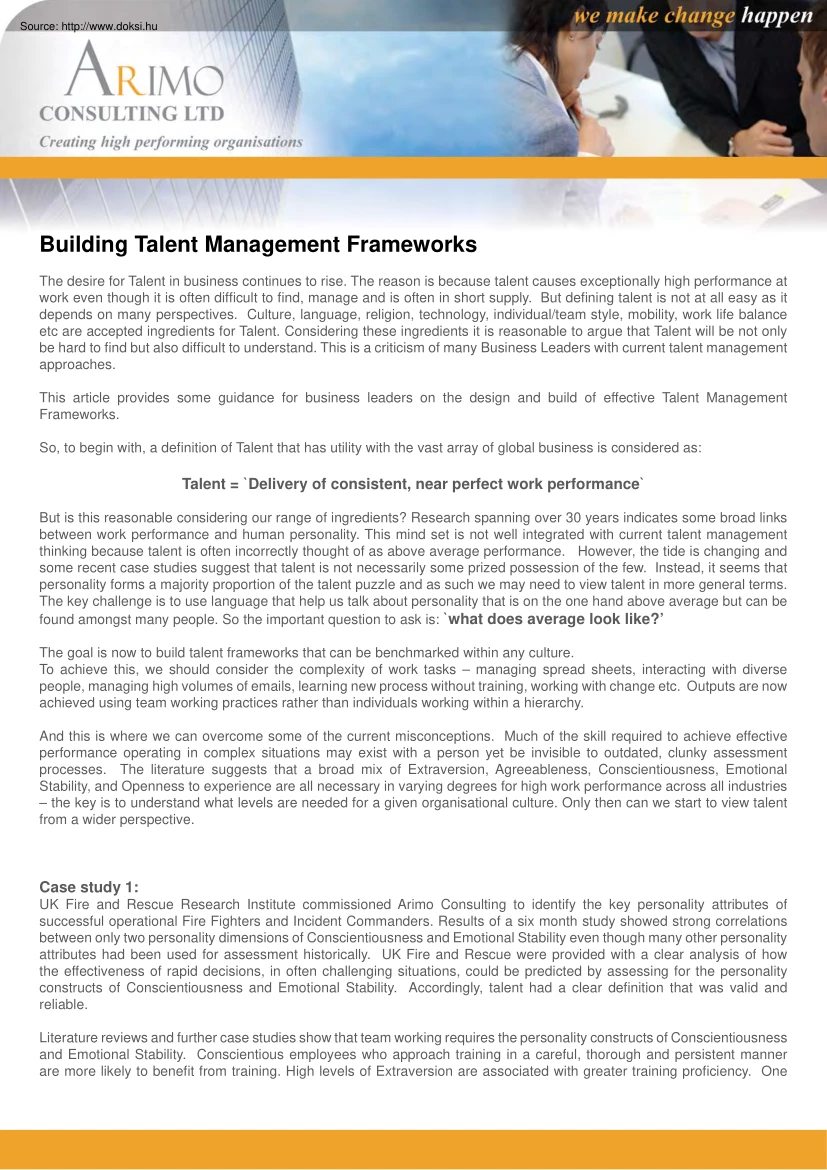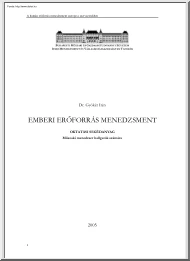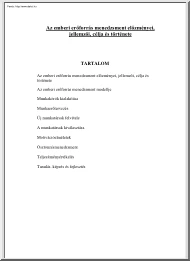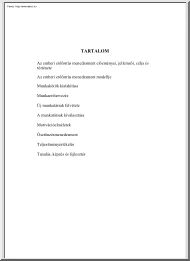Datasheet
Year, pagecount:2008, 2 page(s)
Language:English
Downloads:8
Uploaded:February 22, 2013
Size:47 KB
Institution:
-
Comments:
Attachment:-
Download in PDF:Please log in!
Comments
No comments yet. You can be the first!Content extract
Building Talent Management Frameworks The desire for Talent in business continues to rise. The reason is because talent causes exceptionally high performance at work even though it is often difficult to find, manage and is often in short supply. But defining talent is not at all easy as it depends on many perspectives. Culture, language, religion, technology, individual/team style, mobility, work life balance etc are accepted ingredients for Talent. Considering these ingredients it is reasonable to argue that Talent will be not only be hard to find but also difficult to understand. This is a criticism of many Business Leaders with current talent management approaches. This article provides some guidance for business leaders on the design and build of effective Talent Management Frameworks. So, to begin with, a definition of Talent that has utility with the vast array of global business is considered as: Talent = `Delivery of consistent, near perfect work performance` But is this
reasonable considering our range of ingredients? Research spanning over 30 years indicates some broad links between work performance and human personality. This mind set is not well integrated with current talent management thinking because talent is often incorrectly thought of as above average performance. However, the tide is changing and some recent case studies suggest that talent is not necessarily some prized possession of the few. Instead, it seems that personality forms a majority proportion of the talent puzzle and as such we may need to view talent in more general terms. The key challenge is to use language that help us talk about personality that is on the one hand above average but can be found amongst many people. So the important question to ask is: `what does average look like?’ The goal is now to build talent frameworks that can be benchmarked within any culture. To achieve this, we should consider the complexity of work tasks – managing spread sheets, interacting
with diverse people, managing high volumes of emails, learning new process without training, working with change etc. Outputs are now achieved using team working practices rather than individuals working within a hierarchy. And this is where we can overcome some of the current misconceptions. Much of the skill required to achieve effective performance operating in complex situations may exist with a person yet be invisible to outdated, clunky assessment processes. The literature suggests that a broad mix of Extraversion, Agreeableness, Conscientiousness, Emotional Stability, and Openness to experience are all necessary in varying degrees for high work performance across all industries – the key is to understand what levels are needed for a given organisational culture. Only then can we start to view talent from a wider perspective. Case study 1: UK Fire and Rescue Research Institute commissioned Arimo Consulting to identify the key personality attributes of successful operational
Fire Fighters and Incident Commanders. Results of a six month study showed strong correlations between only two personality dimensions of Conscientiousness and Emotional Stability even though many other personality attributes had been used for assessment historically. UK Fire and Rescue were provided with a clear analysis of how the effectiveness of rapid decisions, in often challenging situations, could be predicted by assessing for the personality constructs of Conscientiousness and Emotional Stability. Accordingly, talent had a clear definition that was valid and reliable. Literature reviews and further case studies show that team working requires the personality constructs of Conscientiousness and Emotional Stability. Conscientious employees who approach training in a careful, thorough and persistent manner are more likely to benefit from training. High levels of Extraversion are associated with greater training proficiency One explanation for this particular finding is that
highly extraverted trainees are more active during training and ask more questions. Agreeableness is shown as relevant in work settings that require considerable interpersonal interaction, particularly when interactions involve helping, cooperating and nurturing others. In fact in these settings, Agreeableness may be the best predictor of job performance. Employees who are intellectual, curious, and imaginative and have broad interests are more likely to benefit from training than those with lower scores against these constructs. So, dimensions of personality not only predict work performance they are the key part of any Talent Framework. The important point is to focus on how personality dimensions are benchmarked because historically, benchmarking has failed to align effectively with core behaviors. Attention to mundane tasks, motivation to learn, tolerance of others and team working are becoming increasingly important – this is true for almost any work. The next step is to
understand that where personality is combined with General Mental Ability (GMA), higher performance can be expected. Case study 2: The task was to assist with the design the selection and assessment process for the HSBC graduate fast track programme. Once an extensive review of current graduate work was conducted, the assessment process was designed to include a high level General Mental Ability Testing as well as personality assessment. This was required because key features of the role description included: numerical reasoning, problem solving with minimal available information and team working. As a consequence high work performance was aligned with top quartile scores in four out of five General Intelligence tests and well as high levels of Conscientiousness and Agreeableness. Over 50 graduates were assessed over a 3 month period Successful candidates were then tracked during their first 12 months in roles. Higher scoring candidates achieved higher levels of work performance in
areas of project management, financial modeling and management accounting. Further high work performance was identified in complex team situation with higher scoring candidate’s in General Mental Ability and personality attributes of Emotional Stability achieving the highest levels of manager and peer review ratings. Designing Talent Framework for global organizations The expression of talent is highly likely to differ across cultures. Personality however, has been shown to be remarkably similar across different cultural situations and contexts. So, as we step up to more dynamic, dynamic Talent Management Frameworks, we need to recognise the unique links that exist in each organisational culture and work outputs. The case studies suggest that any Talent Framework should begin with the premise that Talent is actually more straight forward than previous thinking suggests. Team Working is an essential part organisational performance and as such should be integrated into a Talent
Framework by assessing for a mix of the personality dimensions of Conscientiousness and Agreeableness. Further components of Talent are likely to include: General Mental Ability, Emotional Stability and Openness to new experiences. These broad requirements can be found with most human beings as our case studies show There is a an important caveat to consider before concluding. Although the literature supports personality stability across cultures, some of the current assessment tools have poor reliability and may lack the belief by multi cultural candidates – this requires careful selection of tools but more importantly, extra focus to provide clear definition and language at the point of designing Talent Frameworks. The article proposes that, not only is Talent plentiful, but it can be readily identified and managed in multiple cultures. The key to designing and building successful Talent Management Frameworks is understanding what aspects of personality actually need to be
benchmarked. Arimo Consulting provides Talent Management Solutions for organisations in Europe and the Middle East. For further information contact Luke Minshall, Managing Director of Arimo Consulting Ltd. Phone: +44(0) 7752 040587 Email: info@arimo.couk Web: www.arimocouk
reasonable considering our range of ingredients? Research spanning over 30 years indicates some broad links between work performance and human personality. This mind set is not well integrated with current talent management thinking because talent is often incorrectly thought of as above average performance. However, the tide is changing and some recent case studies suggest that talent is not necessarily some prized possession of the few. Instead, it seems that personality forms a majority proportion of the talent puzzle and as such we may need to view talent in more general terms. The key challenge is to use language that help us talk about personality that is on the one hand above average but can be found amongst many people. So the important question to ask is: `what does average look like?’ The goal is now to build talent frameworks that can be benchmarked within any culture. To achieve this, we should consider the complexity of work tasks – managing spread sheets, interacting
with diverse people, managing high volumes of emails, learning new process without training, working with change etc. Outputs are now achieved using team working practices rather than individuals working within a hierarchy. And this is where we can overcome some of the current misconceptions. Much of the skill required to achieve effective performance operating in complex situations may exist with a person yet be invisible to outdated, clunky assessment processes. The literature suggests that a broad mix of Extraversion, Agreeableness, Conscientiousness, Emotional Stability, and Openness to experience are all necessary in varying degrees for high work performance across all industries – the key is to understand what levels are needed for a given organisational culture. Only then can we start to view talent from a wider perspective. Case study 1: UK Fire and Rescue Research Institute commissioned Arimo Consulting to identify the key personality attributes of successful operational
Fire Fighters and Incident Commanders. Results of a six month study showed strong correlations between only two personality dimensions of Conscientiousness and Emotional Stability even though many other personality attributes had been used for assessment historically. UK Fire and Rescue were provided with a clear analysis of how the effectiveness of rapid decisions, in often challenging situations, could be predicted by assessing for the personality constructs of Conscientiousness and Emotional Stability. Accordingly, talent had a clear definition that was valid and reliable. Literature reviews and further case studies show that team working requires the personality constructs of Conscientiousness and Emotional Stability. Conscientious employees who approach training in a careful, thorough and persistent manner are more likely to benefit from training. High levels of Extraversion are associated with greater training proficiency One explanation for this particular finding is that
highly extraverted trainees are more active during training and ask more questions. Agreeableness is shown as relevant in work settings that require considerable interpersonal interaction, particularly when interactions involve helping, cooperating and nurturing others. In fact in these settings, Agreeableness may be the best predictor of job performance. Employees who are intellectual, curious, and imaginative and have broad interests are more likely to benefit from training than those with lower scores against these constructs. So, dimensions of personality not only predict work performance they are the key part of any Talent Framework. The important point is to focus on how personality dimensions are benchmarked because historically, benchmarking has failed to align effectively with core behaviors. Attention to mundane tasks, motivation to learn, tolerance of others and team working are becoming increasingly important – this is true for almost any work. The next step is to
understand that where personality is combined with General Mental Ability (GMA), higher performance can be expected. Case study 2: The task was to assist with the design the selection and assessment process for the HSBC graduate fast track programme. Once an extensive review of current graduate work was conducted, the assessment process was designed to include a high level General Mental Ability Testing as well as personality assessment. This was required because key features of the role description included: numerical reasoning, problem solving with minimal available information and team working. As a consequence high work performance was aligned with top quartile scores in four out of five General Intelligence tests and well as high levels of Conscientiousness and Agreeableness. Over 50 graduates were assessed over a 3 month period Successful candidates were then tracked during their first 12 months in roles. Higher scoring candidates achieved higher levels of work performance in
areas of project management, financial modeling and management accounting. Further high work performance was identified in complex team situation with higher scoring candidate’s in General Mental Ability and personality attributes of Emotional Stability achieving the highest levels of manager and peer review ratings. Designing Talent Framework for global organizations The expression of talent is highly likely to differ across cultures. Personality however, has been shown to be remarkably similar across different cultural situations and contexts. So, as we step up to more dynamic, dynamic Talent Management Frameworks, we need to recognise the unique links that exist in each organisational culture and work outputs. The case studies suggest that any Talent Framework should begin with the premise that Talent is actually more straight forward than previous thinking suggests. Team Working is an essential part organisational performance and as such should be integrated into a Talent
Framework by assessing for a mix of the personality dimensions of Conscientiousness and Agreeableness. Further components of Talent are likely to include: General Mental Ability, Emotional Stability and Openness to new experiences. These broad requirements can be found with most human beings as our case studies show There is a an important caveat to consider before concluding. Although the literature supports personality stability across cultures, some of the current assessment tools have poor reliability and may lack the belief by multi cultural candidates – this requires careful selection of tools but more importantly, extra focus to provide clear definition and language at the point of designing Talent Frameworks. The article proposes that, not only is Talent plentiful, but it can be readily identified and managed in multiple cultures. The key to designing and building successful Talent Management Frameworks is understanding what aspects of personality actually need to be
benchmarked. Arimo Consulting provides Talent Management Solutions for organisations in Europe and the Middle East. For further information contact Luke Minshall, Managing Director of Arimo Consulting Ltd. Phone: +44(0) 7752 040587 Email: info@arimo.couk Web: www.arimocouk





